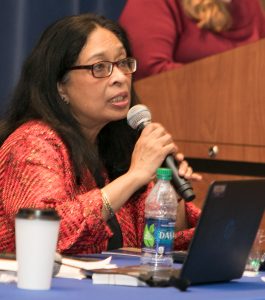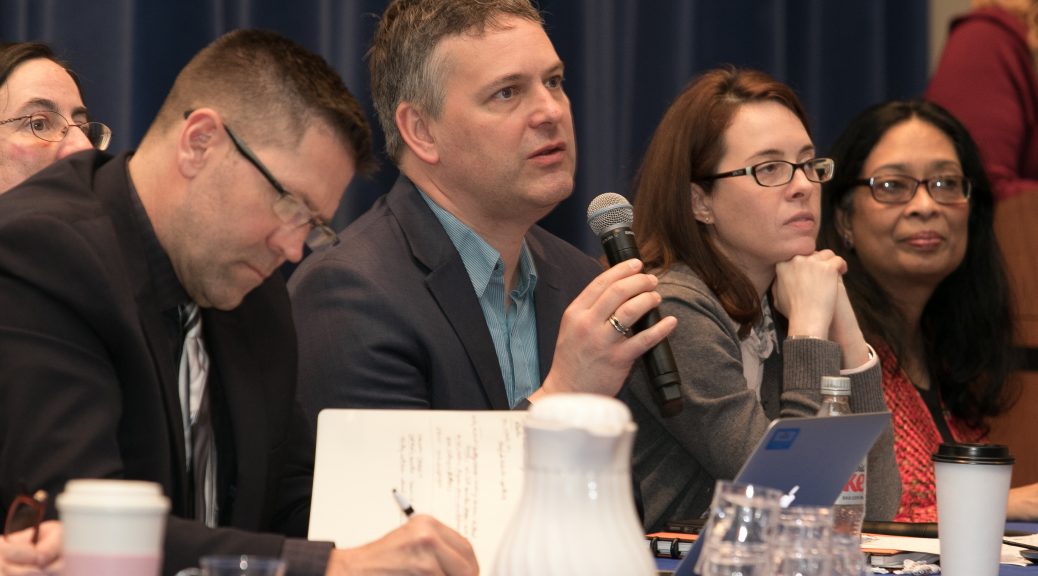NASHVILLE, Tenn. (TSU News Service) – National Science Foundation (NSF) representatives visited the campus of Tennessee State University on Thursday to provide insight for researchers who hope to secure funding from the agency.
The daylong workshop, called NSF Day, included discipline-specific breakout sessions featuring NSF representatives, a panel with NSF-funded researchers from Tennessee and discussions about things to consider before writing a proposal as well as opportunities for fellowships.
Dr. Lesia Crumpton-Young, vice president of Research and Institutional Advancement, welcomed the group to TSU’s Avon Williams Campus with the shout, “Big Blue”, as she applauded them for attending the first NSF Day held in Nashville, Tennessee.
“We are here today to spend time on a topic that is near and dear to my heart,” Crumpton-Young said. “One of the things I love most about each day is the opportunity to think about research, discovery and the things that we have an opportunity as faculty, staff and students to work on that will address global challenges and make a difference in how we live our lives.”
The NSF is the federal agency created by Congress in 1950 “to promote the progress of science; to advance national health, prosperity, and welfare; and to secure the national defense,” according to the foundation’s website. NSF supports fundamental research in science, engineering and education across all disciplines.

Fahmida Chowdhury, program director in the NSF Office of International Science and Engineering (OISE), said researchers should make sure NSF is the right funding agency for them before they begin writing a proposal. She also stressed the importance of pinpointing what is unique and important about the proposed study.
“A lot of times scientists who have a great idea take it for granted that everyone knows it is a great project. It’s a great project for you, but why is it so great for everybody else in your field and not only for the advancement of your field, but also for society at large,” Chowdhury said. “You have to think about those things, and make those part of your motivation for writing the proposal.”
Chowdhury also highlighted the importance of having an effective assessment plan.
“How will you know that what you will do in the next five years has been successful,” she said. “Always make that part of your proposal.”
Muhammad Khan, who currently works as a molecular research analyst with Dr. Ahmad Naseer Aziz, TSU associate professor of Molecular Genetics, said attending NSF Day may help him secure funding to further his research, as well as provide opportunities for students.
“One of our key priorities in writing grants is to benefit the students,” Khan said. “Grants help us provide them with stipends, the chemicals important to their research, and we also expose them to approaches which will help maximize their learning.”
Holly Brown, NSF Lead for the TSU NSF Day said the event gives the foundation an opportunity to reach out to the research community and individuals who are potential researchers.
“Today we have a crowd that is typically early career researchers. Some of them are assistant professors, a lot of them are from the TSU community themselves, and we also have people from other universities in the area,” Brown said.
“At the end of the event we want everyone here to know how to apply for a grant, and to feel comfortable talking to us as program officers and us as the experts,” she added. “It really comes down to, ‘Contact your program officer if you have questions.’ And people really don’t do that if they don’t know who they are.”
US Senator Lamar Alexander said in a video message to attendees that the National Science Foundation has an annual budget of about $7 billion and makes about 12,000 new funding awards each year in fields such as mathematics, computer science and the social sciences.
“Tennessee State should be proud to be selected as one of the four sites that will host an NSF Workshop Day this year,” he said.
Nicholas Kovach, research specialist in the TSU Division of Research and Institutional Advancement, said the university secured more than $2 million from NSF in the last fiscal year.
Department of Media Relations
Tennessee State University
3500 John Merritt Boulevard
Nashville, Tennessee 37209
615.963.5331
About Tennessee State University
With more than 8,000 students, Tennessee State University is Nashville’s only public university, and is a comprehensive, urban, co-educational, land-grant university offering 38 bachelor’s degree programs, 25 master’s degree programs and seven doctoral degrees. TSU has earned a top 20 ranking for Historically Black Colleges and Universities according to U.S. News and World Report, and rated as one of the top universities in the country by Washington Monthly for social mobility, research and community service. Founded in 1912, Tennessee State University celebrated 100 years in Nashville during 2012. Visit the University online at tnstate.edu.
